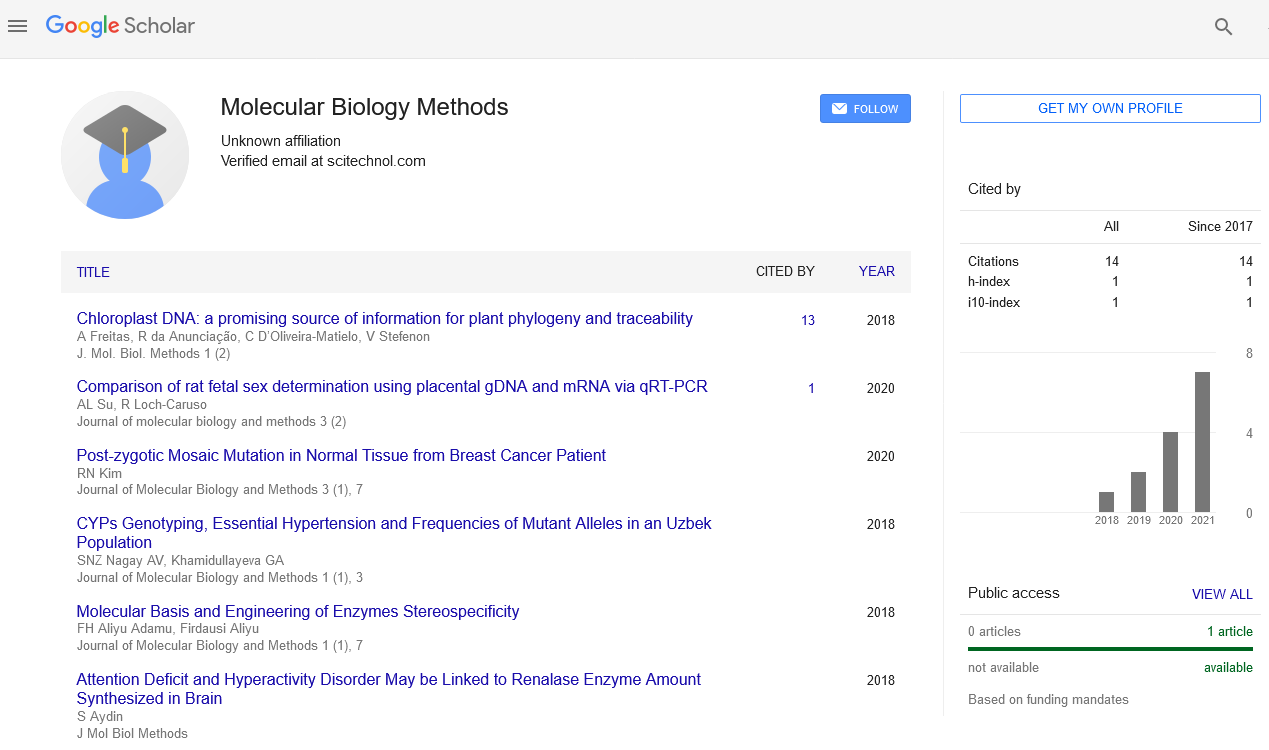Opinion Article, J Mol Biol Methods Vol: 6 Issue: 4
An Overview on Molecular Biology: Applications in Biotechnology and Medicine
Jack Brooks*
1Department of Pharmacy and Bioengineering, Keele University, Staffordshire, UK
*Corresponding Author: Jack Brooks,
Department of Pharmacy and Bioengineering,
Keele University, Staffordshire, UK
E-mail: brooksjack@keele.ac.uk
Received date: 27 November, 2023, Manuscript No. JMBM-24-124364;
Editor assigned date: 30 November, 2023, PreQC No. JMBM-24-124364 (PQ);
Reviewed date: 14 December, 2023, QC No. JMBM-24-124364;
Revised date: 21 December, 2023, Manuscript No. JMBM-24-124364 (R);
Published date: 28 December, 2023 DOI: 10.5958/jmbm.1000152
Citation: Brooks J (2023) An Overview on Molecular Biology: Applications in Biotechnology and Medicine. J Mol Biol Methods 6:4.
Description
Molecular biology is a fascinating field that delves into the intricate mechanisms governing life at the molecular level. It encompasses the study of biological processes occurring within cells, focusing on the structure, function, and interactions of biomolecules like DNA, RNA, proteins, and lipids. This discipline has revolutionized our understanding of life, paving the way for advancements in medicine, agriculture, biotechnology, and beyond.
The roots of molecular biology can be traced back to the mid-20th century when groundbreaking discoveries laid the foundation for this field. At the core of molecular biology lies DNA, the molecule that carries genetic instructions essential for the development, functioning, growth, and reproduction of all known organisms. DNA encodes the information required to build and maintain an organism, determining its traits and characteristics through the genetic code.
The structure of DNA, composed of nucleotides Adenine (A), Cytosine (C), Guanine (G), and Thymine (T) arranged in complementary pairs, forms the basis of its functionality. The complementary base pairing (A-T, G-C) enables faithful replication during cell division and serves as a template for RNA synthesis through transcription.
Transcription involves the synthesis of RNA molecules from a DNA template. RNA, a versatile molecule, plays diverse roles in the cell, acting as a messenger (mRNA), and transferring genetic information; as ribosomal RNA (rRNA), a structural component of ribosomes; and as transfer RNA (tRNA), and carrying amino acids to the ribosome during protein synthesis.
Translation is the process by which the information encoded in mRNA is decoded to produce specific proteins. Ribosomes, composed of rRNA and proteins, facilitate this process by aligning the correct sequence of tRNAs carrying amino acids, leading to the formation of polypeptide chains, which fold into functional proteins.
Molecular biology investigates the mechanisms governing gene regulation, determining when and to what extent genes are expressed. Regulatory elements, such as promoters, enhancers, and repressors, modulate gene expression by controlling transcription. Understanding these mechanisms is important in deciphering diseases, developmental processes, and cell differentiation.
The insights gained from molecular biology have catalyzed advancements in various fields. In biotechnology, genetic engineering techniques like recombinant DNA technology allow the manipulation of genetic material, enabling the production of therapeutic proteins, Genetically Modified Organisms (GMOs), and gene editing tools like CRISPR-Cas9, revolutionizing healthcare, agriculture, and research.
Molecular biology has also significantly contributed to medical diagnostics and treatment. Techniques like Polymerase Chain Reaction (PCR) amplify DNA segments, aiding in disease diagnosis, forensic analysis, and the detection of pathogens. Furthermore, targeted therapies and personalized medicine have emerged through the understanding of molecular pathways underlying diseases. Studying molecular biology offers insights into the evolutionary relationships between species. Comparing DNA or protein sequences among different organisms helps trace evolutionary lineages, providing evidence supporting the theory of evolution and shedding light on the diversification of life on Earth.
Despite remarkable progress, challenges persist in molecular biology. Understanding complex biological systems, such as the human brain or intricate cellular signaling pathways, remain a daunting task. Integrating big data and computational techniques like bioinformatics is important to deciphering these complexities and advancing our knowledge further.
The future of molecular biology holds promise in various areas. Synthetic biology, aiming to design and construct biological devices or systems for practical purposes, may lead to novel applications in medicine, energy production, and environmental sustainability. Additionally, advancements in single-cell analysis techniques may unveil previously hidden cellular heterogeneity and aid in personalized medicine.
Molecular biology has revolutionized our understanding of life's fundamental processes, offering insights into the molecular mechanisms governing living organisms. Its applications in diverse fields continue to shape the world, from healthcare innovations to sustainable agriculture. As technology evolves, the study of molecular biology will undoubtedly unlock new frontiers, offering solutions to longstanding biological mysteries and benefiting humanity in numerous ways.
 Spanish
Spanish  Chinese
Chinese  Russian
Russian  German
German  French
French  Japanese
Japanese  Portuguese
Portuguese  Hindi
Hindi 